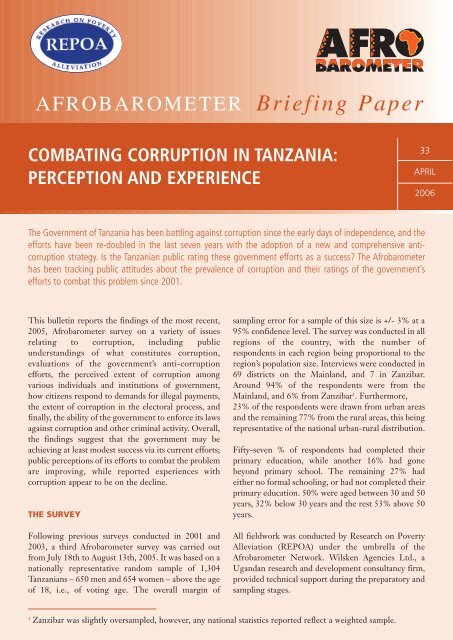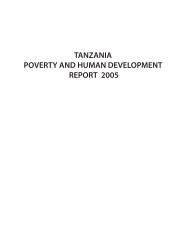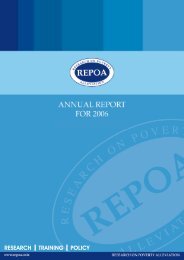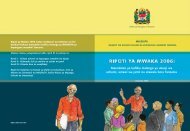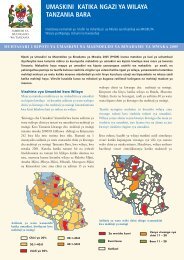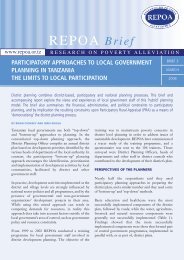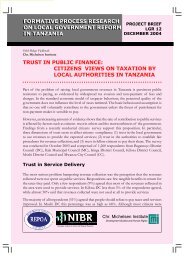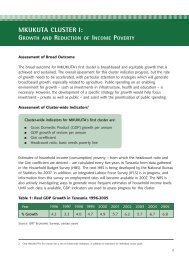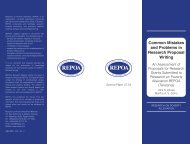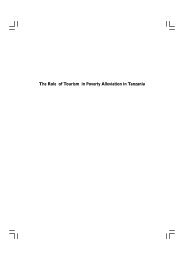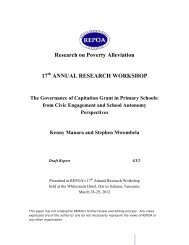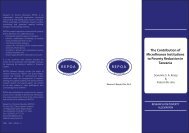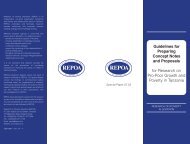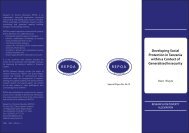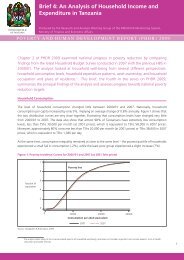Combating Corruption in Tanzania - Repoa
Combating Corruption in Tanzania - Repoa
Combating Corruption in Tanzania - Repoa
You also want an ePaper? Increase the reach of your titles
YUMPU automatically turns print PDFs into web optimized ePapers that Google loves.
AFROBAROMETER Brief<strong>in</strong>g Paper<br />
COMBATING CORRUPTION IN TANZANIA:<br />
PERCEPTION AND EXPERIENCE<br />
33<br />
APRIL<br />
2006<br />
The Government of <strong>Tanzania</strong> has been battl<strong>in</strong>g aga<strong>in</strong>st corruption s<strong>in</strong>ce the early days of <strong>in</strong>dependence, and the<br />
efforts have been re-doubled <strong>in</strong> the last seven years with the adoption of a new and comprehensive anticorruption<br />
strategy. Is the <strong>Tanzania</strong>n public rat<strong>in</strong>g these government efforts as a success? The Afrobarometer<br />
has been track<strong>in</strong>g public attitudes about the prevalence of corruption and their rat<strong>in</strong>gs of the government’s<br />
efforts to combat this problem s<strong>in</strong>ce 2001.<br />
This bullet<strong>in</strong> reports the f<strong>in</strong>d<strong>in</strong>gs of the most recent,<br />
2005, Afrobarometer survey on a variety of issues<br />
relat<strong>in</strong>g to corruption, <strong>in</strong>clud<strong>in</strong>g public<br />
understand<strong>in</strong>gs of what constitutes corruption,<br />
evaluations of the government’s anti-corruption<br />
efforts, the perceived extent of corruption among<br />
various <strong>in</strong>dividuals and <strong>in</strong>stitutions of government,<br />
how citizens respond to demands for illegal payments,<br />
the extent of corruption <strong>in</strong> the electoral process, and<br />
f<strong>in</strong>ally, the ability of the government to enforce its laws<br />
aga<strong>in</strong>st corruption and other crim<strong>in</strong>al activity. Overall,<br />
the f<strong>in</strong>d<strong>in</strong>gs suggest that the government may be<br />
achiev<strong>in</strong>g at least modest success via its current efforts;<br />
public perceptions of its efforts to combat the problem<br />
are improv<strong>in</strong>g, while reported experiences with<br />
corruption appear to be on the decl<strong>in</strong>e.<br />
THE SURVEY<br />
Follow<strong>in</strong>g previous surveys conducted <strong>in</strong> 2001 and<br />
2003, a third Afrobarometer survey was carried out<br />
from July 18th to August 13th, 2005. It was based on a<br />
nationally representative random sample of 1,304<br />
<strong>Tanzania</strong>ns – 650 men and 654 women – above the age<br />
of 18, i.e., of vot<strong>in</strong>g age. The overall marg<strong>in</strong> of<br />
sampl<strong>in</strong>g error for a sample of this size is +/- 3% at a<br />
95% confidence level. The survey was conducted <strong>in</strong> all<br />
regions of the country, with the number of<br />
respondents <strong>in</strong> each region be<strong>in</strong>g proportional to the<br />
region’s population size. Interviews were conducted <strong>in</strong><br />
69 districts on the Ma<strong>in</strong>land, and 7 <strong>in</strong> Zanzibar.<br />
Around 94% of the respondents were from the<br />
Ma<strong>in</strong>land, and 6% from Zanzibar 1 . Furthermore,<br />
23% of the respondents were drawn from urban areas<br />
and the rema<strong>in</strong><strong>in</strong>g 77% from the rural areas, this be<strong>in</strong>g<br />
representative of the national urban-rural distribution.<br />
Fifty-seven % of respondents had completed their<br />
primary education, while another 16% had gone<br />
beyond primary school. The rema<strong>in</strong><strong>in</strong>g 27% had<br />
either no formal school<strong>in</strong>g, or had not completed their<br />
primary education. 50% were aged between 30 and 50<br />
years, 32% below 30 years and the rest 53% above 50<br />
years.<br />
All fieldwork was conducted by Research on Poverty<br />
Alleviation (REPOA) under the umbrella of the<br />
Afrobarometer Network. Wilsken Agencies Ltd., a<br />
Ugandan research and development consultancy firm,<br />
provided technical support dur<strong>in</strong>g the preparatory and<br />
sampl<strong>in</strong>g stages.<br />
1<br />
Zanzibar was slightly oversampled, however, any national statistics reported reflect a weighted sample.
BACKGROUND: THE BATTLE AGAINST<br />
CORRUPTION IN TANZANIA<br />
The Government of <strong>Tanzania</strong> has committed itself to<br />
fight<strong>in</strong>g corruption <strong>in</strong> all spheres of the economy. This<br />
commitment has come from both past and current<br />
presidents. Dur<strong>in</strong>g the <strong>in</strong>auguration of the current<br />
Parliament, the new president, His Excellency Jakaya<br />
Mrisho Kikwete, made it very clear that <strong>in</strong><br />
strengthen<strong>in</strong>g good governance, the problem of<br />
corruption will be dealt with relentlessly:<br />
“Serikali ya Awamu ya Nne itaimarisha utendaji<br />
Serikal<strong>in</strong>i na kupambana na maovu katika jamii bila woga<br />
wala kuoneana muhali.”<br />
“The Fourth Phase Government will strengthen the public<br />
service and fight social ills without fear or favour.”<br />
Speech by H.E. Jakaya Kikwete to the <strong>Tanzania</strong>n<br />
Parliament on 30 December 2005.<br />
The <strong>in</strong>tensity of the fight aga<strong>in</strong>st corruption has<br />
<strong>in</strong>creased as the corruption problem itself has<br />
escalated, particularly <strong>in</strong> the public sector. The efforts<br />
began <strong>in</strong> 1966, when the government established the<br />
Permanent Commission of Enquiry (Ombudsman) to<br />
check on the abuse of powers by government officials<br />
and agencies. To complement the work of the<br />
Commission, <strong>in</strong> 1971 the Government passed a<br />
Prevention of <strong>Corruption</strong> Act, which enabled the<br />
formation of the Anti-<strong>Corruption</strong> Squad <strong>in</strong> 1975. In<br />
2001, the Permanent Commission of Inquiry was,<br />
through an Act of Parliament, transformed <strong>in</strong>to the<br />
Commission for Human Rights and Good<br />
Governance (CHRGG). As corruption nonetheless<br />
worsened, an effort was made to strengthen the Anti-<br />
<strong>Corruption</strong> Squad by transform<strong>in</strong>g it <strong>in</strong>to the<br />
Prevention of <strong>Corruption</strong> Bureau (PCB) under the<br />
President’s Office. As the name suggests, PCB was to<br />
address itself to preventive measures <strong>in</strong>clud<strong>in</strong>g, among<br />
others, educat<strong>in</strong>g the public about the evils of<br />
corruption and how to combat it.<br />
President Benjam<strong>in</strong> William Mkapa came to power <strong>in</strong><br />
1995 and was committed to battl<strong>in</strong>g corruption. He set<br />
up a Presidential Commission of Inquiry Aga<strong>in</strong>st<br />
<strong>Corruption</strong> <strong>in</strong> 1996, known as the Warioba<br />
Commission, which undertook an <strong>in</strong>-depth diagnosis<br />
of the problem and made extensive recommendations<br />
as to how corruption should be prevented and<br />
combated. The Warioba Report has become the<br />
foundation for the new <strong>in</strong>itiative to combat corruption<br />
<strong>in</strong> the country; as such, corruption has become a major<br />
component of the reform <strong>in</strong>itiative <strong>in</strong> the country.<br />
Under this new approach, the government sought to<br />
adopt a coherent strategy, tak<strong>in</strong>g a more holistic and<br />
<strong>in</strong>tegrative approach to tackl<strong>in</strong>g corruption. In the late<br />
1990s, the government prepared a framework paper<br />
on good governance – the National Framework on<br />
Good Governance – <strong>in</strong> l<strong>in</strong>e with the government’s<br />
good governance vision conta<strong>in</strong>ed <strong>in</strong> Vision 2025. The<br />
paper emphasized a government system that was<br />
transparent, responsive and accountable, managed by<br />
officials who are accountable, efficient, ethical and<br />
professional.<br />
For implementation purposes, a National Anti-<br />
<strong>Corruption</strong> Strategy was prepared that was to guide all<br />
branches of the government <strong>in</strong> combat<strong>in</strong>g corruption.<br />
Essentially this entailed ma<strong>in</strong>stream<strong>in</strong>g anticorruption<br />
activities <strong>in</strong> the government m<strong>in</strong>istries,<br />
departments, agencies and local authorities. With<strong>in</strong><br />
such framework, each <strong>in</strong>stitution was to prepare its<br />
own Action Plan. The Action Plans prepared have<br />
been termed the National Anti-<strong>Corruption</strong> Strategy<br />
and Action Plan (NACSAP). To ensure effective<br />
implementation, the government established a<br />
coord<strong>in</strong>at<strong>in</strong>g organ, the Good Governance<br />
Coord<strong>in</strong>ation Unit, <strong>in</strong> the President’s Office, and put<br />
<strong>in</strong> place a monitor<strong>in</strong>g system that produces quarterly<br />
reports from each M<strong>in</strong>isterial Department and Agency<br />
(MDA). Under this new strategy, many former<br />
government employees have lost their jobs (GGCU<br />
Quarterly Monitor<strong>in</strong>g Reports).<br />
GOVERNMENT HANDLING OF CORRUPTION<br />
IN THE PUBLIC SECTOR<br />
We can beg<strong>in</strong> by look<strong>in</strong>g at the public’s broad<br />
assessment of how well or poorly the government is<br />
handl<strong>in</strong>g the battle aga<strong>in</strong>st public sector corruption. In<br />
all three surveys, we have asked respondents “How well<br />
or badly would you say the current government is handl<strong>in</strong>g<br />
the follow<strong>in</strong>g matters, or haven’t you heard enough to say:
fight<strong>in</strong>g corruption <strong>in</strong> government.”<br />
Overall <strong>in</strong> 2005 the Government gets relatively good<br />
marks, with 62% <strong>in</strong>dicat<strong>in</strong>g that the Government is<br />
do<strong>in</strong>g “fairly” or “very well” at this task. This<br />
represents a considerable <strong>in</strong>crease over rat<strong>in</strong>gs <strong>in</strong> 2003<br />
and 2001, and negative evaluations of the Government<br />
have dropped by an even larger marg<strong>in</strong> (“Don’t know”<br />
responses have <strong>in</strong>creased). Urban and rural<br />
respondents have more or less the same responses to<br />
the issue (Table 1). Level of education also has little<br />
effect, except for the fact that those who have less than<br />
a full primary education are less likely to have any<br />
op<strong>in</strong>ion on the subject.<br />
Table 1: Government Handl<strong>in</strong>g of the Fight<br />
Aga<strong>in</strong>st <strong>Corruption</strong>, 2005<br />
Urban Rural Total<br />
Very badly 17 11 12<br />
Fairly badly 12 15 14<br />
Fairly well 39 35 36<br />
Very well 25 26 26<br />
Don’t know 7 13 12<br />
“How well or badly would you say the government is handl<strong>in</strong>g the<br />
follow<strong>in</strong>g matters, or haven’t you heard enough to say: Fight<strong>in</strong>g<br />
corruption <strong>in</strong> government.”<br />
Figure 1: Government Handl<strong>in</strong>g of the Fight Aga<strong>in</strong>st<br />
<strong>Corruption</strong>, 2001-2005<br />
Percent<br />
70<br />
60<br />
50<br />
40<br />
30<br />
20<br />
10<br />
0<br />
43<br />
55<br />
3<br />
41<br />
Obviously, one important aspect of fight<strong>in</strong>g<br />
corruption is enforcement of the law, and actual<br />
punishment for the <strong>in</strong>dividuals <strong>in</strong>volved. How well –<br />
and how even handedly – do <strong>Tanzania</strong>ns th<strong>in</strong>k the<br />
government is do<strong>in</strong>g at enforc<strong>in</strong>g the country’s laws<br />
and hold<strong>in</strong>g both leadership and <strong>in</strong>dividuals<br />
accountable? Overall, <strong>Tanzania</strong>ns th<strong>in</strong>k their<br />
52<br />
2001 2003 2005<br />
Fairly/Very Badly<br />
7<br />
Fairly/Very Well<br />
26<br />
62<br />
12<br />
Don’t Know<br />
government is highly capable of track<strong>in</strong>g down and<br />
punish<strong>in</strong>g their own misdeeds. Roughly 90% th<strong>in</strong>k<br />
that the likelihood of punishment is high if they, or<br />
someone like them, commits a serious crime or fails to<br />
pay a tax.<br />
On the other hand, a considerable number still believe<br />
that top government officials may get away with such<br />
transgressions. While solid majorities th<strong>in</strong>k the<br />
government is likely to enforce the law even aga<strong>in</strong>st<br />
the country’s leadership, about one-third believe that<br />
<strong>in</strong>fluential <strong>in</strong>dividuals can still get away with flout<strong>in</strong>g<br />
the country’s laws.<br />
Figure 2: Likelihood of Punishment<br />
Percent “Likely” / “Very Likely”<br />
100<br />
90<br />
80<br />
70<br />
60<br />
50<br />
40<br />
30<br />
20<br />
10<br />
0<br />
91<br />
58<br />
Commit serious crime<br />
Person like you<br />
“How likely do you th<strong>in</strong>k it would be that the authorities could enforce<br />
the law if:<br />
a) a top government official committed a serious crime;<br />
b) a person like you committed a serious crime;<br />
c) a top official did not pay a tax on some of the <strong>in</strong>come they<br />
earned;<br />
d) a person like you did not pay tax on some of the <strong>in</strong>come<br />
they earned.”<br />
Percent “likely” or “very likely”<br />
PERCEIVED CORRUPTION AMONG<br />
GOVERNMENT LEADERS AND INSTITUTIONS<br />
Table 2 provides additional evidence that the<br />
Government’s anti-corruption efforts may be meet<strong>in</strong>g<br />
with some success. While we must be cautious <strong>in</strong><br />
<strong>in</strong>terpret<strong>in</strong>g results because of differences <strong>in</strong> question<br />
word<strong>in</strong>g and response categories, as well as <strong>in</strong> the<br />
89<br />
Top official<br />
58<br />
Fail to pay tax
<strong>in</strong>dividuals and <strong>in</strong>stitutions asked about across the<br />
three surveys, it nonetheless appears that public<br />
perceptions of the extent of corruption among public<br />
officials, while rema<strong>in</strong><strong>in</strong>g high, have decl<strong>in</strong>ed<br />
noticeably. For example, <strong>in</strong> 2003, 80% thought that<br />
“some,” “most” or “all” police were <strong>in</strong>volved <strong>in</strong><br />
corrupt practices, but <strong>in</strong> 2005 this has dropped to<br />
72%.<br />
Likewise, <strong>in</strong> 2003 58% thought some/most/all<br />
“elected officials” engaged <strong>in</strong> corruption, while <strong>in</strong><br />
2005 a much lower 38% th<strong>in</strong>k MPs are corrupt, and<br />
44% say the same for elected local government<br />
councilors. Similar decl<strong>in</strong>es are evident <strong>in</strong> almost all<br />
categories.<br />
Figure 3: Extent of Perceived <strong>Corruption</strong> among<br />
Public Servants<br />
many countries around the world. In general, it would<br />
appear that – with the exception of teachers and school<br />
adm<strong>in</strong>istrators – it is those officials who have the most<br />
contact with citizens <strong>in</strong> the delivery of services or<br />
other <strong>in</strong>teractions with government (e.g., tax<br />
collection) that are viewed as most corrupt by the<br />
public, while more distant officials such as those <strong>in</strong> the<br />
president’s office and MPs are perceived <strong>in</strong> a somewhat<br />
more positive light. Hence the say<strong>in</strong>g, “it takes two to<br />
tango.”<br />
Table 2: Changes <strong>in</strong> Extent of Perceived <strong>Corruption</strong><br />
among Public Servants, 2001–2005<br />
2005 2003 2001 *<br />
Office of the President 29 41 –<br />
Teachers and School Adm<strong>in</strong>. 36 45 16 ****<br />
MPs 38 58 ** 46 **<br />
National Government Officials 42 67 *** 62 ***<br />
Percent<br />
45<br />
40<br />
35<br />
30<br />
25<br />
20<br />
15<br />
10<br />
5<br />
0<br />
37<br />
34 32<br />
26 30<br />
24<br />
20 19 18 18<br />
8 10 10 11<br />
5<br />
38<br />
39 37<br />
34 34 36<br />
29<br />
25<br />
21 19 19<br />
12 12<br />
9<br />
7<br />
Local Government Councilors 44 58 ** 46 **<br />
Local Government Officials 48 67 *** 67 ***<br />
Tax Officials 55 – –<br />
Health Workers 58 – –<br />
Judges and Magistrates 61 71 44 ****<br />
Police 72 80 80<br />
Local Govt. Councilors<br />
Members of Parliament<br />
Natl. Govt. Officials<br />
Office of President<br />
Local Govt. Officials<br />
Police<br />
Tax Officials<br />
Judges / Magistrates<br />
Health workers<br />
Teachers / School Adm<strong>in</strong><br />
None<br />
Some<br />
Most / All<br />
Nonetheless, it is obvious that there is still<br />
considerable room for improvement when even <strong>in</strong> the<br />
<strong>in</strong>stitution with the best rat<strong>in</strong>g, the office of the<br />
president, it is still true that nearly one-third (29%) of<br />
respondents th<strong>in</strong>k that at least some of the officials<br />
there are corrupt, and more than two-thirds believe<br />
this of the police.<br />
In this, <strong>Tanzania</strong>ns’ views are not different from those<br />
<strong>in</strong> many other develop<strong>in</strong>g countries. The Global<br />
<strong>Corruption</strong> Barometer (2005:4) f<strong>in</strong>ds that police were<br />
rated as the most corrupt <strong>in</strong>stitution <strong>in</strong> 6 out of 8<br />
participat<strong>in</strong>g African countries, and they occupy more<br />
or less the same position <strong>in</strong> Central and Eastern<br />
European countries. Low rank<strong>in</strong>gs for judges and<br />
magistrates and for tax officials are also common <strong>in</strong><br />
“How many of the follow<strong>in</strong>g people do you th<strong>in</strong>k are <strong>in</strong>volved <strong>in</strong><br />
corruption, or haven’t you heard enough about them to say?”<br />
*For 2003 and 2005, percentages reported are those respond<strong>in</strong>g<br />
“some of them,” “most of them” or “all of them”. For 2001,<br />
percentage respond<strong>in</strong>g “fairly common” or “very common” is<br />
reported.<br />
**In 2003 and 2001, the question asked about “elected leaders,<br />
such as parliamentarians or local councilors”, rather than about<br />
each group separately.<br />
***In 2003 we asked about “government officials” generally, rather<br />
than national and local government officials separately, and <strong>in</strong><br />
2001, the question referred <strong>in</strong>stead to “civil servants”.<br />
****In 2001, the question only asked about “teachers”, not<br />
“teachers and school adm<strong>in</strong>istrators”, and about “judges”, not<br />
“judges and magistrates”.
PERSONAL EXPERIENCES OF CORRUPTION<br />
What underlies these perceptions of corruption,<br />
especially with respect to the police? Is it respondents’<br />
personal experiences with these <strong>in</strong>dividuals and<br />
<strong>in</strong>stitutions? Or are their views perhaps formed <strong>in</strong><br />
response to other factors such as popular rumor, media<br />
coverage, or donor <strong>in</strong>terest <strong>in</strong> the issue? To explore<br />
whether perceptions are <strong>in</strong>flated, we asked<br />
respondents about their own personal experiences of<br />
corrupt practices as they go about their daily lives.<br />
Figure 4: Personal Experience of <strong>Corruption</strong>, 2003-<br />
2005<br />
from 8% <strong>in</strong> 2003 to 4% <strong>in</strong> 2005. All <strong>in</strong> all, the 2005<br />
survey f<strong>in</strong>ds that 23% of all respondents report hav<strong>in</strong>g<br />
to offer gifts, tips or bribes at least once with<strong>in</strong> the past<br />
year to get government assistance, and 11% had to do<br />
so more than once. Although the shifts between 2003<br />
and 2005 could be expla<strong>in</strong>ed <strong>in</strong> terms of the marg<strong>in</strong> of<br />
sampl<strong>in</strong>g error (+/- 3% <strong>in</strong> both 2003 and 2005,<br />
mean<strong>in</strong>g that only differences larger than 6% <strong>in</strong>dicate<br />
a def<strong>in</strong>ite shift), the consistency of the trend across<br />
four sectors suggests that these figures do <strong>in</strong> fact<br />
reflect an actual decl<strong>in</strong>e <strong>in</strong> the experience of<br />
corruption. This lends further support to the<br />
argument that the Government’s efforts are <strong>in</strong> fact<br />
hav<strong>in</strong>g some effect on reduc<strong>in</strong>g corruption.<br />
Percent<br />
16<br />
14<br />
12<br />
10<br />
8<br />
6<br />
4<br />
2<br />
0<br />
12<br />
Get document or permit<br />
6<br />
5<br />
Get child <strong>in</strong>to school<br />
5<br />
8<br />
Get medical assistance*<br />
Get a household service<br />
4<br />
15<br />
12<br />
Avoid problem w/police<br />
9<br />
6<br />
Offered gift for vote, 2000<br />
A second set of questions about the quality of<br />
education and health services, however, reveals more<br />
troubl<strong>in</strong>g results. On these questions, 29% report that<br />
they have encountered demands for illegal payments at<br />
their local cl<strong>in</strong>ic or hospital – compared to 15% who<br />
say they actually made such payments. The difference<br />
suggests that perhaps <strong>Tanzania</strong>ns are also feel<strong>in</strong>g<br />
<strong>in</strong>creas<strong>in</strong>gly empowered to resist such demands.<br />
2003 2005<br />
In the past year, how often (if ever), have you had to pay a bribe,<br />
give a gift, or do a favour to government officials <strong>in</strong> order to:<br />
a) Get a document or permit;<br />
b) Get a child <strong>in</strong>to school;<br />
c) Get a household service (like piped water, electricity or a phone);<br />
d) Get medic<strong>in</strong>e or medical attention from a health worker;<br />
e) Avoid a problem with the police (like pass<strong>in</strong>g a checkpo<strong>in</strong>t or<br />
avoid<strong>in</strong>g a f<strong>in</strong>e or arrest)?<br />
And dur<strong>in</strong>g the 2002 election, how often (if ever) did a candidate or<br />
someone from a political party offer you someth<strong>in</strong>g, like food or a<br />
gift, <strong>in</strong> return for your vote?”<br />
% yes, i.e., “once or twice”, “a few times”, or “often”<br />
*Question not asked <strong>in</strong> 2003<br />
In fact the numbers of those who actually encounter<br />
corruption <strong>in</strong> their own lives are relatively low, and<br />
appear to be decl<strong>in</strong><strong>in</strong>g. In 2005, just 6% found<br />
themselves offer<strong>in</strong>g bribes, gifts or favours <strong>in</strong> order to<br />
obta<strong>in</strong> a document or permit, just half the number<br />
reported <strong>in</strong> 2003. Similarly, the number offer<strong>in</strong>g<br />
<strong>in</strong>ducements to obta<strong>in</strong> a household service dropped<br />
Schools fare better, as just 11% were faced with<br />
demands for illegal payments. Just 5% actually went<br />
along with such demands specifically to obta<strong>in</strong> a<br />
placement for their child (though payments for other<br />
school-related requests, e.g., for pass<strong>in</strong>g marks, etc.,<br />
were not asked about).<br />
<strong>Tanzania</strong>ns’ th<strong>in</strong>k that their politicians are actively<br />
engaged <strong>in</strong> corrupt electoral practices, with 48%<br />
report<strong>in</strong>g that they th<strong>in</strong>k politicians “offer gifts to<br />
voters dur<strong>in</strong>g election campaigns” either “often” or<br />
“always”. But <strong>in</strong> fact just 6% say that they were<br />
actually offered such <strong>in</strong>ducements dur<strong>in</strong>g the run-up<br />
to the 2000 national elections.<br />
WHAT IS CORRUPT?<br />
Where do <strong>Tanzania</strong>ns actually draw the l<strong>in</strong>e when<br />
consider<strong>in</strong>g what behaviors on the part of public<br />
officials are corrupt? Is it true, as some contend, that<br />
practices that the <strong>in</strong>ternational community might<br />
deem corrupt are seen by <strong>Tanzania</strong>ns as acceptable<br />
cultural practices, e.g., of “gift giv<strong>in</strong>g”? Or is the
def<strong>in</strong>ition of corruption more global? To answer these<br />
questions, it is useful to take a brief look at how our<br />
respondents def<strong>in</strong>e corrupt practices. We asked about<br />
three different potential acts by government officials,<br />
and whether respondents considered the acts “not<br />
wrong at all”, “wrong but understandable”, or “wrong<br />
and punishable.”<br />
<strong>Tanzania</strong>ns are most tolerant of a public official who<br />
“decides to locate a development project <strong>in</strong> an area<br />
where his friends and supporters lived”. Just 8% th<strong>in</strong>k<br />
such actions are permissible, but another 33% th<strong>in</strong>ks<br />
that although wrong, they are “understandable”, and<br />
hence should not be punished. But even <strong>in</strong> this case, a<br />
majority (55%) f<strong>in</strong>ds the act not just wrong, but<br />
punishable.<br />
TANZANIA FROM A COMPARATIVE<br />
PERSPECTIVE<br />
F<strong>in</strong>ally, how do perceptions and experiences of<br />
corruption and the government’s handl<strong>in</strong>g of it <strong>in</strong><br />
<strong>Tanzania</strong> compare to other countries <strong>in</strong> Africa? We<br />
currently have data from recent Afrobarometer<br />
surveys <strong>in</strong> ten other countries. Overall, <strong>Tanzania</strong> fares<br />
relatively well <strong>in</strong> comparison to others. For example,<br />
as mentioned, 22% of <strong>Tanzania</strong>ns have had to pay a<br />
bribe at least once <strong>in</strong> the past year to obta<strong>in</strong> basic<br />
government services. This falls just below the mean<br />
across the other ten countries of 25% (Figure 6).<br />
Figure 6: Personal Experience of <strong>Corruption</strong>,<br />
Across Countries<br />
Even fewer accept the behaviour of a public official<br />
who “gives a job to someone from his family who does<br />
not have adequate qualifications”, 70% consider this a<br />
punishable action. And nearly three-quarters (73%) of<br />
all respondents th<strong>in</strong>k that an official who “demands a<br />
favour or an additional payment for some service that<br />
is part of his job” is violat<strong>in</strong>g his responsibility to the<br />
public.<br />
Percent, at least one time<br />
60<br />
50<br />
40<br />
30<br />
20<br />
10<br />
0<br />
Kenya<br />
48<br />
41<br />
Uganda<br />
33<br />
Ben<strong>in</strong><br />
32<br />
Ghana<br />
29<br />
Zambia<br />
24<br />
Mali<br />
22<br />
<strong>Tanzania</strong><br />
17<br />
South Africa<br />
11 10<br />
Lesotho<br />
Malawi<br />
4<br />
Botswana<br />
Clearly, <strong>Tanzania</strong>ns for the most part share<br />
<strong>in</strong>ternational perceptions of how public officials are<br />
supposed to behave <strong>in</strong> execut<strong>in</strong>g their responsibilities.<br />
Traditional cultural practices, whether of gift giv<strong>in</strong>g or<br />
other varieties, do not, <strong>in</strong> the eyes of the <strong>Tanzania</strong>n<br />
public, entitle government officials to take advantage<br />
of them.<br />
Figure 5: What is Corrupt?<br />
% who had to pay a bribe, give a gift, or do a favour to government<br />
officials at least once <strong>in</strong> the past year to obta<strong>in</strong> services <strong>in</strong>dicated <strong>in</strong><br />
Figure 4.<br />
Moreover, <strong>Tanzania</strong>ns give their government one of<br />
the highest rat<strong>in</strong>gs for its performance <strong>in</strong> battl<strong>in</strong>g<br />
corruption, as shown <strong>in</strong> Figure 7.<br />
80<br />
70<br />
60<br />
55<br />
70<br />
73<br />
Percent<br />
50<br />
40<br />
30<br />
34<br />
23 21<br />
20<br />
10<br />
0<br />
7<br />
Development for<br />
friends / supporters<br />
4<br />
Job for unqualified<br />
family member<br />
1<br />
Favour or payment<br />
for service<br />
Not wrong at all<br />
Wrong but understandable<br />
Wrong and punishable
Figure 7: Government Handl<strong>in</strong>g of <strong>Corruption</strong>,<br />
Across Countries<br />
Percent “Fairly” or “Very well”<br />
“How well or badly would you say the government is handl<strong>in</strong>g the<br />
follow<strong>in</strong>g matters, or haven’t you heard enough to say: Fight<strong>in</strong>g<br />
corruption <strong>in</strong> government.”<br />
% “fairly” or “very well”<br />
F<strong>in</strong>ally, compar<strong>in</strong>g perceived corruption levels just for<br />
officials <strong>in</strong> the Office of the President, as well as police,<br />
we see that <strong>Tanzania</strong>ns’ perceptions of the behavior of<br />
their president and officials <strong>in</strong> his office are better than<br />
<strong>in</strong> all of the other countries (Figure 8). Just 5% th<strong>in</strong>k<br />
that most or all of these officials are corrupt, compared<br />
to a mean across the other 10 countries of 23%. Levels<br />
of perceived corruption with the country’s police force,<br />
while less exceptional, also fall well below the mean for<br />
the other 10 countries of 49%.<br />
Figure 8: Extent of Perceived <strong>Corruption</strong> Among<br />
Public Servants, Across Countries<br />
them"<br />
of<br />
"All<br />
"Most" or<br />
Percent<br />
70<br />
60<br />
50<br />
40<br />
30<br />
20<br />
10<br />
80<br />
70<br />
60<br />
50<br />
40<br />
30<br />
20<br />
10<br />
0<br />
0<br />
43<br />
63 62<br />
Botswana<br />
58<br />
Ben<strong>in</strong><br />
<strong>Tanzania</strong><br />
30<br />
15 16<br />
Botswana<br />
55<br />
Ghana<br />
52<br />
Ghana<br />
26<br />
53<br />
Malawi<br />
64<br />
Kenya<br />
7<br />
47<br />
40 39 38<br />
“How many of the follow<strong>in</strong>g people do you th<strong>in</strong>k are <strong>in</strong>volved <strong>in</strong><br />
corruption, or haven’t you heard enough about them to say:<br />
a) The President and Officials <strong>in</strong> his office;<br />
b) The police?”<br />
% “Most of them” or “All of them”<br />
43<br />
South Africa<br />
Uganda<br />
40<br />
35<br />
28 25<br />
19<br />
Lesotho<br />
Office of the President<br />
Malawi<br />
Kenya<br />
50<br />
Mali<br />
Police<br />
18<br />
Lesotho<br />
36<br />
5<br />
South Africa<br />
Mali<br />
34<br />
25<br />
<strong>Tanzania</strong><br />
Zambia<br />
67<br />
Uganda<br />
31<br />
13<br />
Ben<strong>in</strong><br />
70<br />
Zambia<br />
SYNTHESIS<br />
Overall, these f<strong>in</strong>d<strong>in</strong>gs suggest that while <strong>Tanzania</strong> still<br />
has far to go <strong>in</strong> combat<strong>in</strong>g corruption, particularly<br />
among the police, tax officials, the judiciary, and health<br />
workers, the country is mak<strong>in</strong>g some ga<strong>in</strong>s under its<br />
new comprehensive strategy. The public is giv<strong>in</strong>g the<br />
Government better marks for its handl<strong>in</strong>g of the<br />
problem now than <strong>in</strong> the past, and perceptions of the<br />
extent of corruption, while still quite high, are clearly<br />
on the decl<strong>in</strong>e. It also appears that actual <strong>in</strong>dividual<br />
experiences with corruption may be on decreas<strong>in</strong>g as<br />
well.<br />
It is worth not<strong>in</strong>g, however, that while corruption is an<br />
issue of great concern to the <strong>in</strong>ternational community,<br />
this battle is given fairly low priority by <strong>Tanzania</strong>ns<br />
themselves. When asked to identify up to three of the<br />
country’s most important problems that the<br />
Government should address, just 3% of all responses<br />
named corruption as a priority problem. It thus falls<br />
n<strong>in</strong>th on the list of <strong>Tanzania</strong>ns’ priorities, well beh<strong>in</strong>d<br />
water supply (15%), health (14%), and <strong>in</strong>frastructure<br />
and roads (12%).<br />
The public perception that corruption is decl<strong>in</strong><strong>in</strong>g<br />
identified <strong>in</strong> this Afrobarometer survey is corroborated<br />
by other external observations. The World Bank<br />
Institute’s governance <strong>in</strong>dicators, which look at<br />
changes <strong>in</strong> the quality of governance <strong>in</strong> Africa from<br />
1996 to 2004 with respect to control of corruption,<br />
voice and accountability, and governance effectiveness,<br />
place <strong>Tanzania</strong> among countries that have experienced<br />
significant improvements. In addition, the country’s<br />
score on Transparency International’s <strong>Corruption</strong><br />
Perceptions Index (CPI) has improved from 2.5 <strong>in</strong><br />
2003 to 2.9 <strong>in</strong> 2005.<br />
Thus, the Government may <strong>in</strong>deed be on the right<br />
track <strong>in</strong> tackl<strong>in</strong>g this vex<strong>in</strong>g issue. If President Kikwete<br />
can ma<strong>in</strong>ta<strong>in</strong> his commitment to this issue, the country<br />
can hope to see still further improvements <strong>in</strong> future.
REFERENCES<br />
1. Transparency International, <strong>Corruption</strong> Perceptions Index, 2003<br />
2. Transparency International, <strong>Corruption</strong> Perceptions Index, 2005<br />
3. Transparency International, Report-Global <strong>Corruption</strong> Barometer 2005<br />
4. United Republic of <strong>Tanzania</strong>, the National Anti-<strong>Corruption</strong> Strategy and Action Plan for <strong>Tanzania</strong>, 1999<br />
5. United Republic of <strong>Tanzania</strong>, Quarter Monitor<strong>in</strong>g Report (various)<br />
6. United Republic of <strong>Tanzania</strong>, the National Framework on Good Governance 1999<br />
7. World Bank Institute, Governance <strong>in</strong>dicators, 2005<br />
8. United Republic of <strong>Tanzania</strong>, Hali ya Rushwa Nch<strong>in</strong>i <strong>Tanzania</strong>, (the State of <strong>Corruption</strong> <strong>in</strong> <strong>Tanzania</strong>),<br />
Annual Report 2002<br />
Afrobarometer is a comparative series of national public attitude surveys on democracy, markets and civil society<br />
<strong>in</strong> Africa. It is an <strong>in</strong>dependent, non-partisan research project that measures the social, political and economic<br />
atmosphere <strong>in</strong> Africa. Afrobarometer surveys are conducted <strong>in</strong> more than a dozen African counties and are<br />
repeated on a regular cycle. Because the <strong>in</strong>strument asks standard sets of questions, countries can by<br />
systematically compared and trends <strong>in</strong> public attitudes can be tracked over time.<br />
Country and regional reports can be obta<strong>in</strong>ed from the Afrobarometer website:<br />
www.afrobarometer.org<br />
To obta<strong>in</strong> pr<strong>in</strong>ted copies of work<strong>in</strong>g papers and reports please contact Afrobarometer at:<br />
The Institute for Democracy <strong>in</strong> South Africa (IDASA)<br />
6 Sp<strong>in</strong> Street, Church Square, Cape Town 8001, South Africa<br />
Tel: +27 21 461 2559 Fax: +27 21 461 2589<br />
E-mail: annie@idasact.org.za<br />
Three reports relat<strong>in</strong>g to <strong>Tanzania</strong>ns' perceptions of economic growth, corruption and the delivery of social<br />
services <strong>in</strong> <strong>Tanzania</strong>, can be obta<strong>in</strong>ed from REPOA, and from their website: www.repoa.or.tz, or from the<br />
Afrobarometer website.<br />
Brief<strong>in</strong>g Paper 33: <strong>Combat<strong>in</strong>g</strong> <strong>Corruption</strong> <strong>in</strong> <strong>Tanzania</strong>: Perception and Experience<br />
Brief<strong>in</strong>g Paper 34: Delivery of Social Services on Ma<strong>in</strong>land <strong>Tanzania</strong>: Are People Satisfied?<br />
Brief<strong>in</strong>g Paper 36: Despite Economic Growth, <strong>Tanzania</strong>ns Still Dissatisfied<br />
This Brief<strong>in</strong>g Paper was prepared by REPOA. The Afrobarometer is produced collaboratively by social scientists<br />
from 18 African countries. Coord<strong>in</strong>ation is provided by Wilsken Agencies, Ltd. <strong>in</strong> Uganda, the Institute for<br />
Democracy <strong>in</strong> South Africa (Idasa), the Centre for Democratic Development (CDD-Ghana) and Michigan State<br />
University. REPOA should like to thank Wilsken Agencies, Ltd. and Michigan State University for their<br />
technical support dur<strong>in</strong>g the third Afrobarometer survey (2005) <strong>in</strong> <strong>Tanzania</strong>.<br />
Several donors support the Afrobarometer’s research, capacity build<strong>in</strong>g and outreach activities, <strong>in</strong>clud<strong>in</strong>g the UK<br />
Department for International Development (DFID), Swedish International Development Cooperation Agency,<br />
the Netherlands M<strong>in</strong>istry of Foreign Affairs,The Royal Danish M<strong>in</strong>istry of Foreign Affairs, and the U.S. Agency<br />
for International Development (USAID). REPOA thanks DFID and USAID for f<strong>in</strong>ancial support <strong>in</strong> <strong>Tanzania</strong>.<br />
Research on Poverty Alleviation REPOA<br />
P.O.Box 33223, Dar es Salaam, <strong>Tanzania</strong><br />
157 Mgombani Street, Regent Estate<br />
Tel: +255(0)(22) 270 00 83 / 0713 326 064<br />
Fax: +255(0)22) 277 57 38<br />
Email: repoa@repoa.or.tz<br />
www.repoa.or.tz


